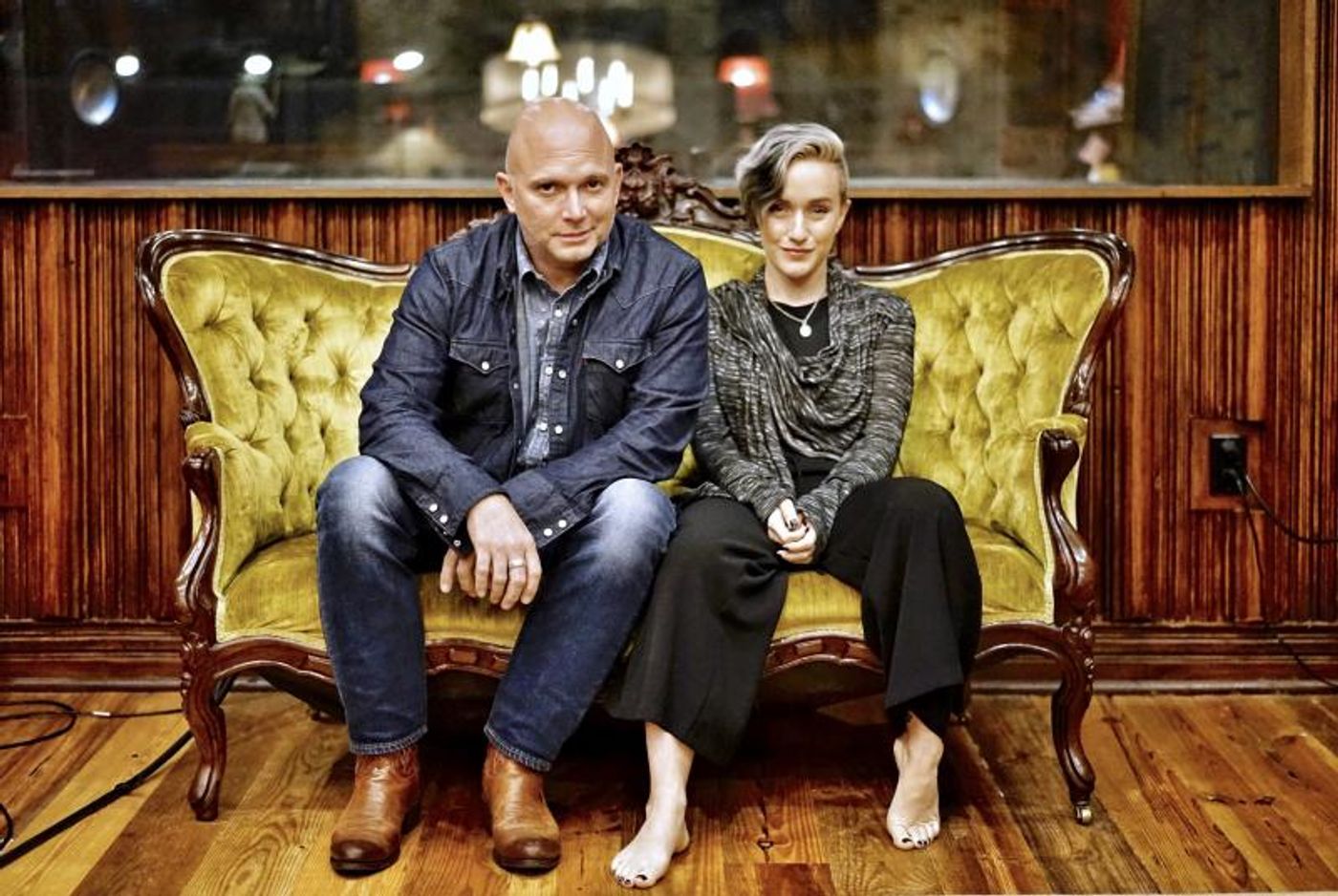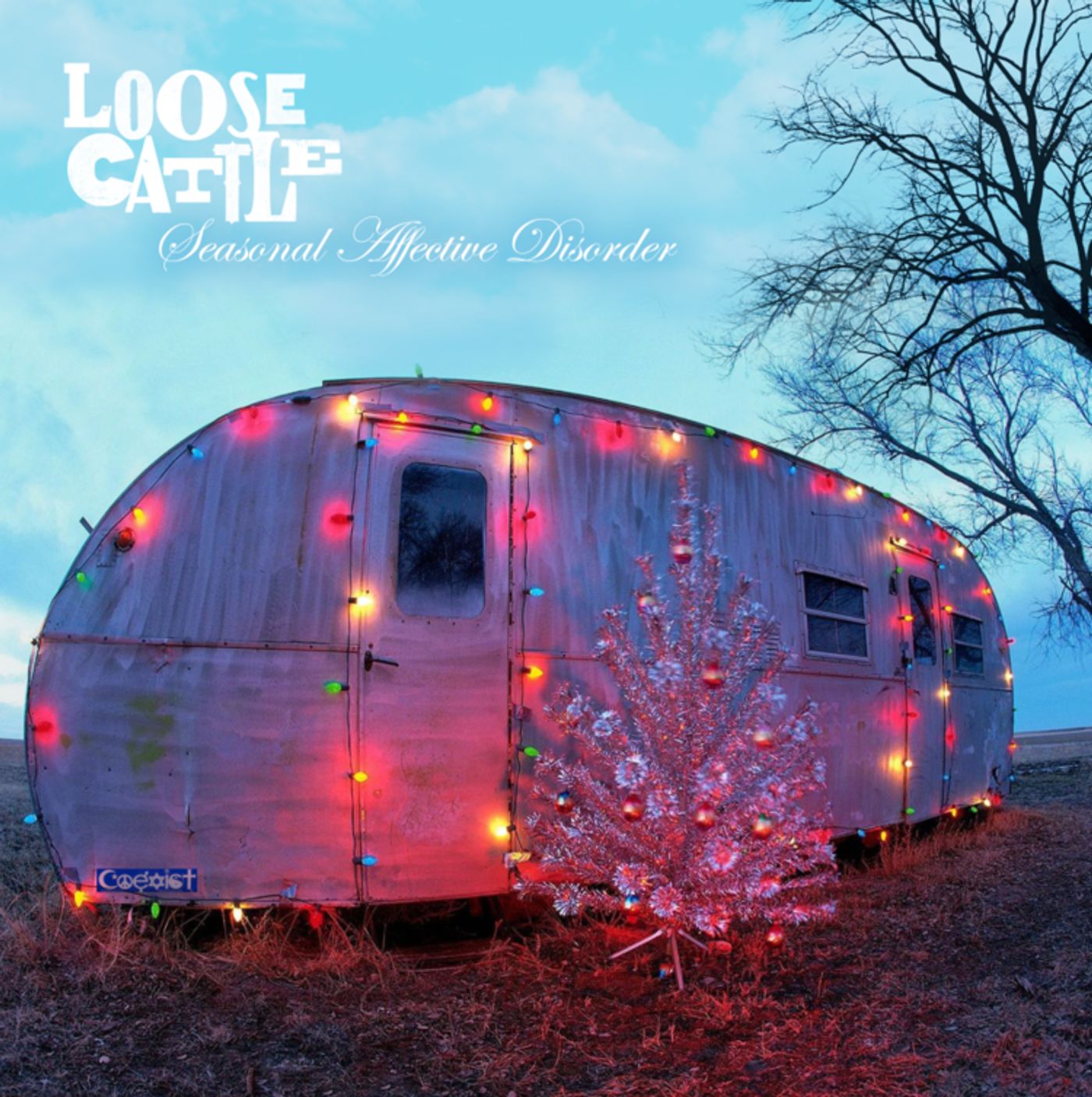Interview: Michael Cerveris and Kimberly Kaye Talk Loose Cattle's SEASONAL AFFECTIVE DISORDER

Photo by Michael Alford.
Loose Cattle, fronted by two-time Tony award winner Michael Cerveris and Kimberly Kaye, have released a holiday album that explores the real feels of the holidays. Shoving Burl Ives and Irving Berlin out of the way, Loose Cattle's SEASONAL AFFECTIVE DISORDER is the perfect album for anyone willing to admit that their December isn't all sparkles, snow, champagne, cheer, and mirth. We recently sat down with the duo to get the inside scoop on the music
Loose Cattle has a folksy, down-home-sitting-on-the-front-porch sound. How did you make the arrangements of your covers?
Michael Cerveris: I think it was a combination of things. In some cases we had pretty clear ideas of how we were going to record some songs-the ones that are more in our typical formation of guitar, bass, drums vocals, two vocals, fiddle, pedal steel, and those kinds of things. For some of the songs-like the more New Orleans flavored songs with horns-we got Mark Mullins, who's really a highly regarded trombone player from New Orleans who does horn arrangements for everybody from Doctor John to his own band Bonerama. That changed the sound of a lot of things. Then, especially, I think, the most interesting thing in that regards is the two songs Kimberly does solo: "The Christmas Card From a Hooker in Minneapolis" and "River."
Kimberly Kaye: Tom McDermott is this pretty remarkable piano freak down here in New Orleans who studies all aspects of music. But, sitting down to talk with him about working on things, he felt strongly the way we did - if you're doing a cover song, doing a tribute cover song isn't the idea. Joni Mitchell is kind of great at being Joni Mitchell, and trying to do better thank Joni Mitchell being Joni Mitchell would be a waste of time. So, we looked at what influences he can add in piano and what influences we could use in our own vocals, our storytelling, to make those songs our own. The songs that are just us and sound kind of like a porch gathering are the ones we did up in New York over the years. What was it Michael like 2011? 2012? 2013?
Michael Cerveris: Yeah.
Kimberly Kaye: Then, the ones that have that different sound are the ones we worked with musicians to build up the sound in a way that felt natural to everyone.
Michael Cerveris: That's a good point. In a way, this record kind of charts our development as a band. The first recording we did-"Jesus Christ," the Big Star song-we did in 2011. We started the band in summer of 2011, and we recorded that in December of 2011. So, we'd only been a band for a short while when we did that.
Kimberly Kaye: We did that as a thing just for friends. It wasn't like we were recording a Christmas album for a bunch of people. It was like this little thing we would shoot off as our Christmas card for the year.
Michael Cerveris: Exactly. And, then, the more recent stuff we recorded in New York and New Orleans over the course of this summer and early autumn. And, the fact that it all hangs together as a record is a tribute to Mark Bingham and David Barbe. Mark mixed a lot of the early recordings. And, David Barbe is a hero of mine because of his work with the Drive-by Truckers and a lot of bands I really admire. They found ways to make the songs hang together. Greg Calbi, who mastered the record, really did a fantastic job making different songs recorded in different years...
Kimberly Kaye: In different studios. With different musicians.
Michael Cerveris: ...all live in a coherent record. But, I think that adds to the variety of it, that it wasn't all tracked in one session in one place.
Thematically, the songs all gel and work well with the album's title - SEASONAL AFFECTIVE DISORDER. How did you land on this collection of songs that feel fun, fresh, and a bit tongue-in-cheek, but also feels more real than a standard Christmas album?
Kimberly Kaye: Michael has a real, earnest, authentic love for Christmas, the holidays, and tradition. And, I kind of hate the holidays. It's a tough time of year for me. I used to work retail during the holidays and wanted to blow my brains out. Then, this last year, specifically, I was dealing with my pretty scary illness that put in the hospital for a whole bunch of months.
Michael Cerveris: And, even worse, in Cleveland.
Kimberly Kaye: Yeah! It took me to the hospital in Cleveland, in The Rust Belt, in the dead of winter. If you want to get a real experience of what the-dead-of-winter holiday can feel like, just go to Cleveland and spend even a week there. You don't have to do the full month. You'll get the gist.
The variety of songs on SEASONAL AFFECTIVE DISORDER came from a pretty authentic marrying of Michael's genuine love for the season and this time of year and my genuine disdain for it and just wanting it to be over. We put it in an album that wasn't too depressing and wasn't too cheery. Michael did a lot of research while I was in the hospital, and we managed to find a bunch of songs that were about-I hate the term "human experience" because it's such a cliché! It's like, "Oh, it's an album about the human experience." But, really good holiday music is just really good songwriting that just happens to have specific references to winter or a holiday setting. "Dominick, the Christmas Donkey" is a crap Christmas song. But, a lot of people might argue that "Christmas Card From a Hooker..." is not even a Christmas song. A lot of the best holiday songs, even "I'll Be Home For Christmas," are songs about all year long feels that people experience that just so happen to happen at Christmas. So, I think finding the ones that told a very human story was the important thing.
Michael Cerveris: I think you're the first person who's identified it as a Christmas album that deals with real things, and I really appreciate that. I think that is what we we're trying to do. I think these days, especially, we're confronted hard with the realities around us, and a lot of those realities seem hard to believe. I understand the instinct to just want to disappear in complete fantasy and to romanticize the holidays and things, but it's just too difficult to overlook the realities around us. What Kim went through going through her illness made me and the rest of the band take stock of just how difficult life is and how important it is to celebrate the little victories of banding together and celebrating what we can celebrate. So, the songs that really spoke to us were songs that had some element of looking at your fellow man and recognizing that we're all going through our own versions of tough times and looking at ways to do that together and recognize our shared place on this planet.
Kimberly Kaye: It's like an accidental Buddhist Christmas album. If the nature of everything is suffering, how can we celebrate Christmas?
Michael Cerveris: Yeah. How can that be a thing?
Kimberly Kaye: A very Buddhist Christmas.

DISORDER.
Michael Cerveris: It is no accident that we photoshopped a little Coexist bumper sticker that is made up of all of the symbols of the major world religions on the bottom corner of the trailer on the cover. We photoshopped that on there because we wanted that to be the subtle message underneath all of it. It is definitely a Christmas record, but it is really a non-denominational folk, humanist Christmas record.
And, then, the one song that we wrote was our attempt to distill all of those feelings into a single message of solidarity from the band to anyone who is struggling at this time. Even the people who are having the best Christmas are struggling to do that, I think.
Right. Christmas is that time when everyone looks happy, but it can also be a big front to hide whatever we are dealing with.
Kimberly Kaye: Exactly.
Michael Cerveris: And, we all think that everybody else is having a better time than we are. We all think that everybody else is fine and that we're the only one that it is finding it difficult, and this record, and that song in particular - the "Shepherds in a Parking Lot" song - are our ways of saying, "No, we're all dealing with this, and if we can all sort of acknowledge that it will all be better."
My favorite aspect of the album is that it does have quite a bit of humor. Even dealing with the themes of human existence, I can't help but smile listening to it. And, it's really fun that it is not another cover of Mariah Carey's "All I Want For Christmas Is You." I like that song, but...
Michael Cerveris: Yeah. There's a place for all of that. We're just filling in the gaps.
Kimberly Kaye: We like to sort of fall into the cracks in the table.
Michael Cerveris: We're like the Christmas cookie crumbs.
Kimberly Kaye: And, we feel pretty good about that.
Michael Cerveris: Exactly.
Loose Cattle's SEASONAL AFFECTIVE DISORDER can be purchased from their webstore, iTunes, Amazon, and elsewhere music is sold. For more information about the band and their upcoming shows, please visit http://www.loosecattleband.com.
Videos

